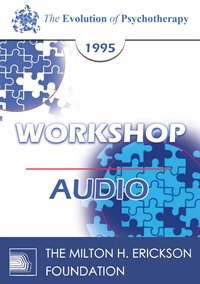
- Average Rating:
- Not yet rated
- Topic Areas:
- Workshops | Psychotherapy | Therapist Development
- Categories:
- Evolution of Psychotherapy | Evolution of Psychotherapy 1995
- Faculty:
- Paul Watzlawick, PhD
- Duration:
- 2 Hours 36 Minutes
- Format:
- Audio Only
- Original Program Date:
- Dec 13, 1995
- Short Description:
- Human problems can be seen as "games without end; " that is, as recurring behaviors based on the continuous application of rigid rules, but devoid of rules for the change of these rules. What are such "meta-rules" and how can they be introduced?
- Price:
- $15.00 - Base Price
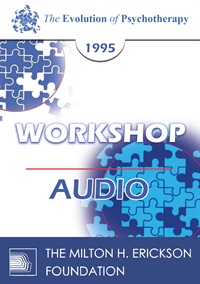
- Average Rating:
- Not yet rated
- Topic Areas:
- Workshops | Psychotherapy | Resistance | Therapeutic Relationship | Therapist Development
- Categories:
- Evolution of Psychotherapy | Evolution of Psychotherapy 1995
- Faculty:
- James Bugental, PhD | David Young, Ph.D. | Molly Sterling, Ph.D.
- Duration:
- 1 Hour 28 Minutes
- Format:
- Audio Only
- Original Program Date:
- Dec 13, 1995
- Short Description:
- The client's task is to try to be open to his/her inner experiencing, disclosing it to the therapist. A client discovers difficulties in doing so, thus disclosing the resistances which are isomorphic with the client's difficulties in life more generally. The therapist's task is to teach and monitor this process.
- Price:
- $15.00 - Base Price
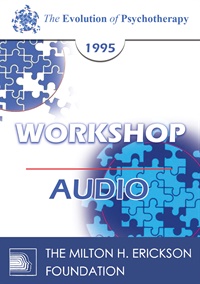
- Average Rating:
- Not yet rated
- Topic Areas:
- Workshops | Cognitive Behavior Therapy (CBT) | Post-Traumatic Stress Disorder (PTSD) | Psychotherapy | Trauma
- Categories:
- Evolution of Psychotherapy | Evolution of Psychotherapy 1995
- Faculty:
- Donald Meichenbaum, PhD
- Duration:
- 55:09
- Format:
- Audio Only
- Original Program Date:
- Dec 13, 1995
- Short Description:
- The focus will be on the cognitive-behavioral treatment of adults who have been ''victimized'' by natural and intentional design. Specific assessment and treatment interventions will be critically examined and demonstrated.
- Price:
- $15.00 - Base Price
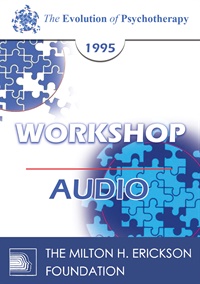
- Average Rating:
- Not yet rated
- Topic Areas:
- Workshops | Addiction | Homework | Psychotherapy | Treatment Planning
- Categories:
- Evolution of Psychotherapy | Evolution of Psychotherapy 1995
- Faculty:
- Claudia Black, PhD
- Duration:
- 2 Hours 50 Minutes
- Format:
- Audio Only
- Original Program Date:
- Dec 13, 1995
- Short Description:
- Those who grow up in chemically dependent families have strong survivorship skills. Unfortunately, for too many, they continue to present to the world a false self often becoming our "closeted" depressed, angry and addicted client. This workshop focuses on 1) treatment orientation and priorities, and 2) core clinical issues. Due to the managed care environment, experiential focus will be on homework assignments.
- Price:
- $15.00 - Base Price
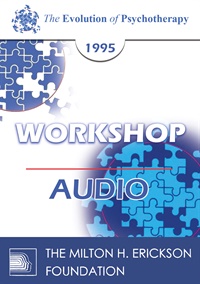
- Average Rating:
- Not yet rated
- Topic Areas:
- Workshops | Psychotherapy | Therapist Development
- Categories:
- Evolution of Psychotherapy | Evolution of Psychotherapy 1995
- Faculty:
- Erving Polster, PhD
- Course Levels:
- Master Degree or Higher in Health-Related Field
- Duration:
- 2:34:09
- Format:
- Audio Only
- Original Program Date:
- Dec 14, 1995
- Short Description:
- The human reflex to summarize and animate experiences is a springboard for the formation of selves. Through lecture and live therapy demonstrations, Dr. Polster will show how to identify the population of selves within and how to restore linkage among them, creating a dependable sense of personal identity.
- Price:
- $15.00 - Base Price
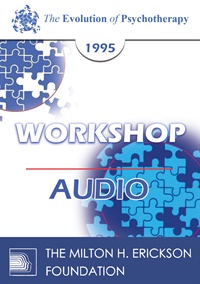
- Average Rating:
- Not yet rated
- Topic Areas:
- Workshops | Bioenergetics | Mind-Body | Psychotherapy
- Categories:
- Evolution of Psychotherapy | Evolution of Psychotherapy 1995
- Faculty:
- Alexander Lowen, MD | Heiner Steckel, Dipl. Pad.
- Duration:
- 2 Hours 30 Minutes
- Format:
- Audio Only
- Original Program Date:
- Dec 14, 1995
- Short Description:
- Patients come to therapy because they have problems. These problems range from difficulties in working, in social and sexual relationships and in functioning. Symptoms may be depression, anxiety and fear, or a general sense that life has no meaning. In all cases it can be seen that the body is emotionally crippled by chronic muscular tensions which limit the person's energy and decreases his vitality. In this workshop Lowen explains how one recognizes these tensions and how they can be released.
- Price:
- $15.00 - Base Price
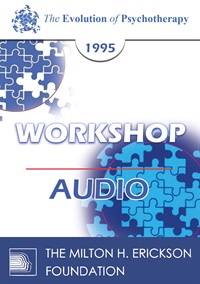
- Average Rating:
- Not yet rated
- Topic Areas:
- Workshops | Psychotherapy | Existential Therapy | Religion
- Categories:
- Evolution of Psychotherapy | Evolution of Psychotherapy 1995
- Faculty:
- Thomas Szasz, MD
- Duration:
- 2:39:51
- Format:
- Audio Only
- Original Program Date:
- Dec 14, 1995
- Short Description:
- Szasz considers the role of responsibility in religion, civil and criminal law, medicine and the mental health professions; the differences among existential responsibility, moral blameworthiness and legal accountability; that connections between (mental) competence and responsibility; and relates all of the above to problems in psychotherapeutic theory and practice.
- Price:
- $15.00 - Base Price
Tags: Existential Psychotherapy Religion
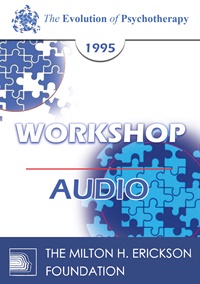
- Average Rating:
- Not yet rated
- Topic Areas:
- Workshops | Rational Emotive Behavior Therapy (REBT) | Psychotherapy
- Categories:
- Evolution of Psychotherapy | Evolution of Psychotherapy 1995
- Faculty:
- Albert Ellis, PhD
- Duration:
- 2 Hours 39 Minutes
- Format:
- Audio Only
- Original Program Date:
- Dec 14, 1995
- Short Description:
- The main principles and most popular techniques of Rational Emotive Behavior Therapy (REBT) will be presented and detailed. There will be live demonstrations with volunteers from the audience.
- Price:
- $15.00 - Base Price
Tags: Psychotherapy REBT Albert Ellis
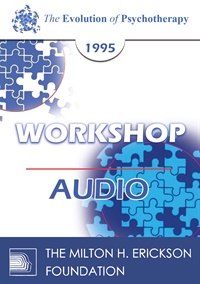
- Average Rating:
- Not yet rated
- Topic Areas:
- Workshops | Focusing | Meditation, Spirituality and Yoga | Psychotherapy
- Categories:
- Evolution of Psychotherapy | Evolution of Psychotherapy 1995
- Faculty:
- Eugene Gendlin, PhD
- Duration:
- 2 Hours 50 Minutes
- Format:
- Audio Only
- Original Program Date:
- Dec 14, 1995
- Short Description:
- This experiential workshop will begin with a guided silent meditation. Gendlin will work with volunteers from the audience to show how to find "Focusing." The physically felt body sense of a problem is at first unclear and gradually opens and becomes clear. There will be discussion and demonstrations to show how Focusing is used in the context of psychotherapy.
- Price:
- $15.00 - Base Price
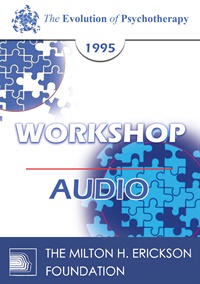
- Average Rating:
- Not yet rated
- Topic Areas:
- Workshops | Psychotherapy | Therapist Development
- Categories:
- Evolution of Psychotherapy | Evolution of Psychotherapy 1995
- Faculty:
- Jeffrey Zeig, PhD
- Course Levels:
- Master Degree or Higher in Health-Related Field
- Duration:
- 2:11:59
- Format:
- Audio Only
- Original Program Date:
- Dec 14, 1995
- Short Description:
- How does one master the practice of psychotherapy? Should training emphasize theory, technique, or research? What about the personal growth of the clinician? We will identify seven essential "postures" through a series of graduated, Psychoaerobics exercises. Attendees will participate in growth games and group hypnosis to explore the merging of discipline and spontaneity that occurs in the most artful and effective clinical work. The program focuses on refining the therapist's lenses (perception), muscles (therapeutic power), heart (compassion), and hat (social role). Educational Objectives: (1) List three therapist postures that were especially well-developed in Erickson. (2) Given a case, describe how to use a Psychoaerobic exercise.
- Price:
- $15.00 - Base Price
Please wait ...

